[Teams of two HS students will write a brief and present oral arguments on NYS Rifle & Pistol Association v. Bruen]
The Harlan Institute and Ashbrook are pleased to announce the Tenth Annual Virtual Supreme Court Competition. This competition offers teams of two high school students the opportunity to research cutting-edge constitutional law, write persuasive appellate briefs, argue against other students through video chats, and try to persuade a panel of esteemed attorneys during oral argument that their side is correct. This year the competition focuses on New York State Rifle & Pistol Association Inc v. Bruen.
The competition is endorsed by the Center for Civic Education's We The People Competition:
The Virtual Supreme Court Competition helps students gain the skills they need to understand, synthesize, and advocate for reasoned legal positions on timely and relevant constitutional issues, and in doing so deepens their commitment to the rule of law. The program directly supports the highest goals of the Center for Civic Education to develop enlightened and responsible members of our society, and it is a privilege to be a part of this important work. Christopher R. Riano President, The Center for Civic Education Member Board of Advisors, The Harlan Institute
The Question
Resolved:
Tournament Instructions
Using historical materials related to the Second Amendment, and the precedents of the United States Supreme Court, teams of two high-school students will write an appellate brief, and present oral arguments, addressing this question:
- Does the Second Amendment allow the government to prohibit a law-abiding person from carrying handguns outside the home for self-defense?
Petitioners will argue that the Second Amendment prohibits states from denying a law-abiding person a license to carry a handgun outside the home.
Respondents will argue that the Second Amendment does not prohibit states from denying a law-abiding person a license to carry a handgun outside the home.
Phase 1—Research and Write Your Brief
Coaches can register their teams at the Institute of Competition Sciences. After registering, teachers should contact the Harlan Institute and Ashbrook at info@HarlanInstitute.org. We will assign teams to argue on behalf of the Petitioners or the Respondents.
Teams will research and write their briefs. The brief must be a minimum of 2,000 words. Please download this template. The brief should have the following sections:
- Table of Cited Authorities: List all of the original sources, and other documents you cite in your brief.
- Summary of Argument: State your position succinctly in 250 words or less.
- Argument: Structure your argument based on at least five primary historical sources and at least three Supreme Court precedents. The more authorities you cite, the stronger your argument will be–and the more likely your team will advance.
- Conclusion: Summarize your argument, and argue how the Supreme Court should decide this issue.
Be sure to proofread your work. The work must be yours, and you may not seek help from anyone else–including attorneys or law students. Students who submit plagiarized briefs will be disqualified.
Please review the winning submissions from previous years:
- OT 2020 – Torres v. Madrid
- OT 2019 – Espinoza v. Montana Department of Revenue
- OT 2018 – Timbs v. Indiana
- OT 2017 – Carpenter v. United States
- OT 2016 – Trinity Lutheran Church v. Comer
- OT 2015 – Abigail Fisher v. University of Texas, Austin (II)
- OT 2014 – Zivotofsky v. Kerry
- OT 2013 – National Labor Relations Board v. Noel Canning
- OT 2012 – Abigail Fisher v. University of Texas, Austin (I)
Phase 2—Virtual Mentoring
Teams that register before November 1, 2021 will be invited to participate in a virtual mentoring session. These sessions will be hosted during the week of November 15, 2021. The Harlan Institute will match each class with a mentor from our network. These sessions will be helpful to finalize your briefs and prepare your preliminary round arguments.
Phase 3—Preliminary Round
For the preliminary round, each team must prepare a YouTube video. The argument must be at least 15 minutes in length. Coaches will ask their students the following ten questions:
- What does the Second Amendment protect?
- Why did the Framers include the Second Amendment in the Bill of Rights?
- What are the limits of the Second Amendment's protection?
- What weapons does the term "arms" include?
- What is the difference, if any, between the verbs "keep" and "bear"?
- What is a militia and why did the Framers refer to it in the Second Amendment?
- How should courts determine if a gun control regulation is considered "long standing"?
- What is strict scrutiny? Intermediate scrutiny? Rational-basis review?
- Is there a difference between openly-carrying a firearm, and conceal-carrying a firearm?
- How should the Court consider the public safety implications of licenses to carry firearms?
Teams will upload a PDF of their brief, as well as a link to their YouTube video to the Institute of Competition Sciences. The deadline for the preliminary round will be December 15, 2021.
Phase 4—Virtual Rounds
We will hold the Virtual Rounds over Zoom:
- 2/12/22 and 2/13/22: Semifinal Round
- 3/5/22 and 3/6/22: Round of 8
- 3/19/22 and 3/20/22: Round of 4
This video offers five tips to prepare for oral argument: https://www.youtube.com/watch?v=dtxQ8b1bwfM
Phase 5—Championship Round Rounds
The top teams will receive a free trip to Washington, D.C. to argue the championship round before federal judges on April 25-26, 2022.Good luck! And register today.
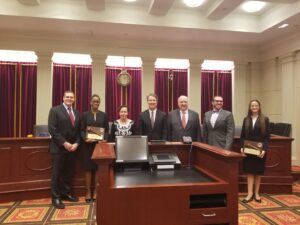
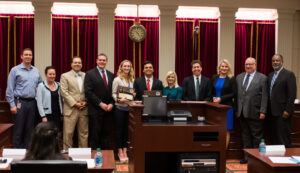
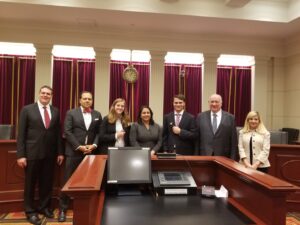
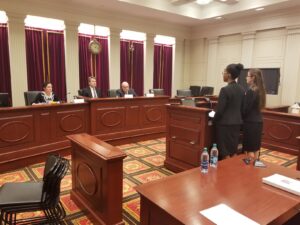

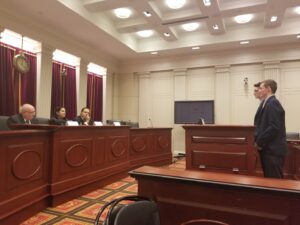
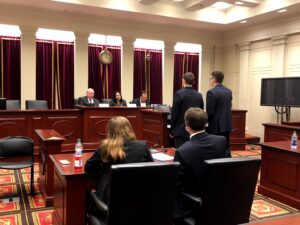
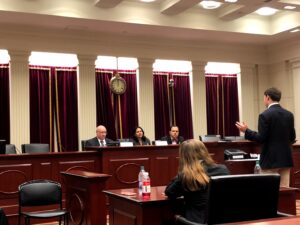
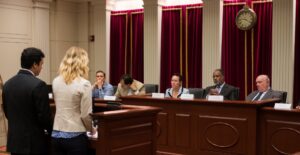
The Prizes
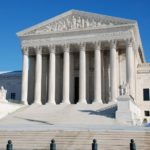 Grand Prize—The Solicitors General of FantasySCOTUS
Grand Prize—The Solicitors General of FantasySCOTUS
The members of top Petitioner and Respondent teams will be invited to attend the Ashbrook Academy on the Supreme Court and the Constitution in June 2022. Ashbrook will cover reasonable travel costs to the academy. Members of the winning team will each receive a $500 Amazon gift card. Members of the runner-up team will each receive a $250 Amazon.com gift card.
Semifinalists
Members of the four finalist teams will each receive a $100 Amazon.com gift card.
Instructions
Coaches can register their teams at the Institute of Competition Sciences. Read the problem, and get started! Good luck. Please send any questions to info@harlaninstitute.org.

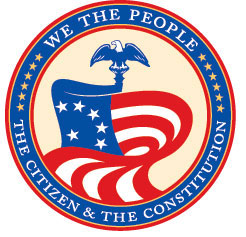
No comments:
Post a Comment